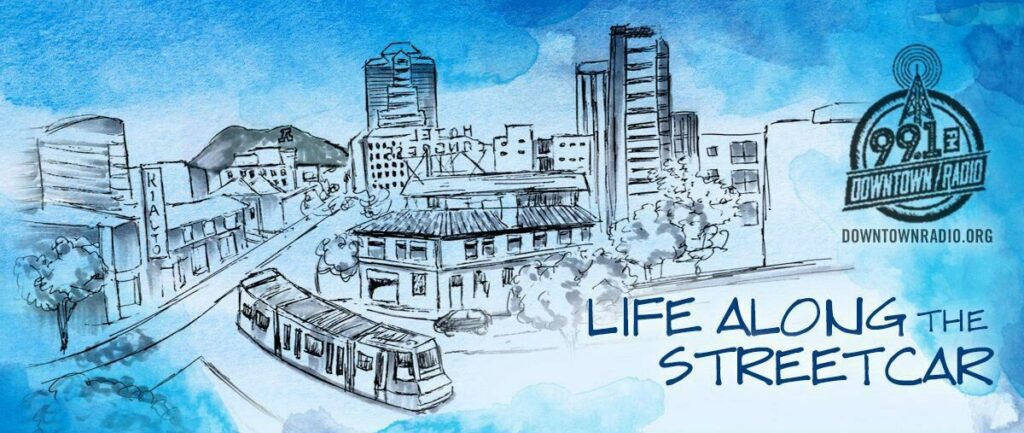Transcript
The Holiday Table
Tom Heath: Good morning Tucson! It’s a beautiful day in the Old Pueblo. Thank you for spending a part of your Sunday brunch hour with us on your Downtown Tucson Community sponsored rock and roll radio station. This week, we speak with Jonathan Mabry and Janos Wilder of the nonprofit Tucson city of gastronomy and see how that designation is impacting our local food scene.
Tom Heath: Today is November 24th. My name is Tom Heath and you are listening to Life Along the Streetcar. Each and every Sunday, our focus is on social, cultural and economic impacts in Tucson’s Urban core and we shed light on hidden gems everyone should know about.
Tom Heath: From A Mountain to the U of A and all stops in between you get the inside track right here on 99.1 FM streaming on Downtown Radio dot org also available on your own or Android using our very own app. You just want to head to your respective App Store and download Downtown Radio Tucson.
Tom Heath: If you want to get us here on the show, our email address is contact at Life along the streetcar.org. We’re over on Facebook at Life Along the Streetcar. We’re on Twitter and you can also now check out past episodes by going to our web page www.LifeAlongTheStreetcar.org.
Tom Heath: And we’re going to start Today’s Show with a Holiday Kickoff. You heard me, Holiday Kickoff. Hard to believe that we are just a few days away from Thanksgiving and that’s going to launch the whole Christmas buying season or celebrating season depending on how you look at it.
Tom Heath: Well, here in Tucson we are featuring some of those same opportunities, of course Black Friday, the well-known day after Thanksgiving or supposedly everything is on sale and time to start shopping for Christmas. In Tucson, though, on Saturday the 30th, a lot of festivities happening in the downtown area.
Tom Heath: It’s Small Business Saturday. So the idea is that you want to support your local and your smaller businesses and not just the large corporations that you might have seen advertising on Black Friday. Small Business Saturday takes place all over the United States. Not just in Tucson. We are celebrating at downtown 4th Avenue and Main Gate Square, and we’re celebrating that by having free Streetcar Rides.
Tom Heath: So if you want to come and check out the shops in those areas hop on the streetcar and a little bit earlier this year than in previous years is the annual Parade of Lights. This is the 25th year, the 25th Annual Parade of Lights used to happen sometime in early December now, it’s kicking off on this Saturday November 30th.
Tom Heath: Mr. Car Wash is the title sponsor and I think they’ve I’ve heard they’ve stepped up not just with their dollars, but it have a lot of volunteers out helping out this year. So appreciate that. They are a local business. So it’s good to see them getting involved. If you’ve been downtown then you see in the the tightly wrapped trees and over the next week.
Tom Heath: You’ll see the festive, festive nature of downtown expand the 30th will have the tree lighting ceremony and Jacome Plaza roughly 5:30 and the Parade of Lights will start around 6:30. I understand it to be a shorter route this year. Fewer entries and focusing on a higher quality of entry, according to Kathleen Erickson at the Downtown Tucson Partnership. So she expects a shorter and more exciting parade this year for the 25th Annual.
Tom Heath: The tree lighting will be the official last official Duty, I’m told, of Mayer Rothschild and perhaps the first official duty of mayor-elect Regina Romero. So come on Downtown, hit the shops. There with the free street car rides and stick around for the tree lighting the Parade of Lights and then the After Party with music and all kinds of festivities there at Jacome Plaza.
Tom Heath: Well, it is approaching Thanksgiving. So it’s appropriate that we talked about a little food. In 1983, a young Chef who had traveled the world wanted to bring in an international cuisine Concepts to Tucson and apply them to Local ingredients. He opened a restaurant and the El Presidio neighborhood in a space leased from the Tucson Museum of Art the restaurant opened on Halloween in 1983 and came with a simple name of Janos. After
Tom Heath: the first name of its founder Chef Janos Wilder Jonathan Mabry has spent decades uncovering Tucson’s past and was a major part of the discovery evidencing 4,200 years of continuous agricultural history in our area, making Tucson one of the longest such places in the United States. Mabry also has a reputation as an expert in the area of local food and Advocate on how food impacts communities, so it’s no surprise that it’s no coincidence that Jonathan Mabry and Chef Janos Wilder became two of those on the front lines of an effort to bring the UNESCO city of gastronomy designation to Tucson.
Tom Heath: Well that designation was awarded in 2015, but the work continues that application has to be renewed every few years and the impact of that award has sent Ripple effects through Tucson’s culinary community. We caught up with Jonathan and Janos at Downtown Kitchen and Cocktails to discuss the significance of that designation and what it means for Tucson now and in the future. Today is Part 1 of 2. We’ll air the completion of our interview next week. So we bracketing Thanksgiving with a philosophical contemplation of Our Food Connection through our heritage.
Janathan Mabry: I’m Jonathan Mabry, and I’m the Executive director of the nonprofit Tucson city of gastronomy.
Tom Heath: Also with the you’re still at the University of Arizona?
Janathan Mabry: Yes. I’m also a researcher at the Desert Laboratory on Tumamoc Hill
Janos Wilder: I’m Janos Wilder, the president of the board of the Tucson City of Gastronomy, board of directors and I own Downtown Kitchen and Cocktails. Where we’re sitting today and the Carriage House, which is our event space limit my practice.
Tom Heath: Well gentlemen, thank you both for your time. This this Interview came about because in 2015. I believe the United Nations education science and cultural organization. I believe UNESCO designated Tucson is the first city in list the United States as a city of gastronomy, and it’s part of their creative cities designations, and I was just actually floored by the amount of time and effort. This wasn’t a fluke. Luke that they just picked Tucson as the first city there’s a lot of effort that went into that. Can you kind of talk about that?
Janathan Mabry: Yeah, it was a two-year effort and I have to start with Gary Nabhan who is a well-known Anthropologist, ethnobotanist and author and a Local Foods activist who came to the Mayor of Tucson and to me at the time I was the historic preservation officer for the city, and he told us about this Creative Cities Network, and he said Tucson should apply to be a City of Gastronomy.
Janathan Mabry: And I’ve collaborated with Gary on various things over more than 30 years and no I’m well and the mayor was on board and I was on board and we had Add a whole group that worked on the application in 2014 was the first time we applied and it was a great group and we learn so much by compiling the information needed for the application. And then when we heard back from UNESCO, we got a one-page letter that said we had a strong application, but we just missed the scoring cut off, but they Encouraged us to reapply they the letter said you can strengthen your application in this way. And by the way, no city has gotten it their first try so we were encouraged to try again and we thought oh, we’ll just beefed up the application that we already had because they already told us how to how to make it better.
Janathan Mabry: But when the new call for applications came out the next year, the questions were completely different in the format was completely different. But anyway, long story short we did reapply and in December of 2015. We got the great news that we receive the designation.
Tom Heath: Now the application. This isn’t just saying hey, we got really cool restaurants. We’ve got Janos we’ve got all this great food. There’s there’s a there’s a huge backs toward all of this?
Janathan Mabry: UNESCO created this program to recognize cities that are using culture and creativity as strategies for sustainable development and they’re looking for cities not the biggest most obvious cities in each of these creative Fields, but the up-and-coming cities where this designation can make a difference. And the other creative Fields by the way, our music film literature media arts design crafts and folk art and Gastronomy in a city can apply for designation in any one of those fields.
Janathan Mabry: Often get the question. Why didn’t Tucson also apply for one of those other fields because we’re going to some of those things too, but we’re only allowed to apply under one field. That’s it. That’s it. And you’re right that it’s not we did not receive the designation because of our great restaurants. We have great restaurants, but The reason we got the designation, I believe is because of our unparalleled agricultural history in this area.
Janathan Mabry: This area has the longest continuous agricultural history in the United States going back more than 4,000 years and other things that were emphasized in the application include the University of Arizona is a world leader in food research. An education and we have these Innovative Progressive policies and regulations by the city and the county that make it easier to grow and sell food within the urban area and we have all of these food activist organizations that are raising awareness of the issues of food insecurity and food in Justice and we have amazing programs like our County Library System.
Janathan Mabry: You can walk into any of the 17 branches with your library card and check out free desert adapted seeds to take home and grow food Garden in your yard, and it goes on and on so it’s a combination of our Deep agricultural history are culturally layered Cuisine and all of the Innovative things were doing in different parts of our food system that I believe are the reasons that we receive the designation.
Tom Heath: So actually that really quickly though. We’re very we’re very fortunate then because your your history with the city, you’re both our city helped to uncover some of that 4,000 years worth of archaeology and you also known I think as one of the forerunners Owners of local the local food movement here in Tucson.
Janathan Mabry: No, thank you. That actually was Part of my part of my career before I got to the city. But yes, I am an archaeologist and I was involved in some of the investigations that that demonstrated Tucson’s deep agricultural history. And I was also on the board of the Santa Cruz Valley Heritage Alliance, which was an early leader in the local and Heritage Foods movement.
Tom Heath: Well, then we have Janos, who has a reputation for for his his food quality. Your first restaurant was opened in Tucson and 80, 1983. And I remember I look back and I found an article in the Tucson citizen. I thought this was a perfect summary for today. This was on October 28th at 1983. So a few days before you open and they’re asking about your Cuisine and there was a question about whether If there’s a French influence and that would be so heavy on the food. And in the last phrase of that our article was your quote saying “the food will be prepared in a way that speaks for itself.” That seems to be indicative of your entire career here in Tucson. The food speaks for itself.
Janos Wilder: We opened our first restaurant here in actually, I’m Halloween three days after that are after that article came out in 1988 III and I had come back from working in France and we settled here in Tucson. My wife’s from no gallus would be living in Colorado when the Santa Fe before that. I went to work in Bordeaux and came back and my first love was French cooking and but of all the things that were working in France was the heart and soul of Kazim with the relationship between the shepherd has Gardener for the chef – bread maker or the chef in the fisherman and so was really about where you got your products to determine what you cook.
Janos Wilder: And so I was determined at that point to really look into the source of it on my products. And so we literally did start advertising for gardeners back then before we advertised for staff and over the But still at wanted to cook French food, but localized it by using local ingredients at that point. I didn’t even know what were the local ingredients because I’m going to the desert at that point and I better go the things I know about the nothing else grows here and then began to realize the donít of recognition took some period of time but over the years.
Janos Wilder: I realized the the incredible deep and long history agricultural history. You and started using a lot of those products and our faith in our cooking really develop the photo of the flavor profiles that we work with Steve both in agricultural products and their cultural culinary history is as well to create and to determine what this would have been the cultural culinary icons of the region were to work for those.
Tom Heath: So it seems like a natural fit to get involved with the city of this drive. How did you get what you pulled in or did you hear about this and say Let me in?
Janos Wilder: so no I got I got asked her. So Jonathan was the primary author of the application. I’ve known Gary for many many years as well. And I’m not sure who it was that invited me to participate in that application process or part of application. I wasn’t part of that part of the application process and became interested because I soon realized that we were sort of on Parallel paths. Because that had really become in many ways. My life work was working with ingredients from this region and the flavors of the region and the and so the the things that were in that application and what it meant to be a city of astronomy, the things are super important to me and so that I was invited to be on the board right after it’s showtime. I think I might have been on board. And I’ve been on it ever since and Jonathan was the board president and has just over the summer become the executive director and I took on the role of for president.
Tom Heath: I’ll be right back for the completion of our interview with Janos Wilder and Jonathan Mabry of the Tucson city of gastronomy. But first, I want to remind you that you’re listening to Life along the streetcar on Downtown Radio, 99.1 FM and available for streaming on DowntownRadio.org. All right, we’re going to jump right back to our interview with Janos Wilder and Jonathan Mabry from the Tucson City of Gastronomy Organization. This is part 1 of 2 next week. We’ll finish up our interview with them after the Thanksgiving holiday.
Tom Heath: So that leads to a I think the next part which is this designation was not just an award. This is an obligation or responsibility. It’s actually led to even the application probably seems like the easy part at this point because it’s Add to an entire effort to maintain that designation you just don’t get it and hang it on the wall?
Janos Wilder: A couple ways because yes, we are required and Jonathan will speaks for to the details of that but we’re required to recertify every four years or five years or four years. So we are applying for recertification right now, but it’s the sort of its channels the work that we do. You and the way it doesn’t feel like an obligation. It feels more like a honor the work that we’re doing in Tucson is so exciting and so fun and so multi-layer that yeah, we need to be doing this but boy, what a great opportunity to do it in channels reference in ways that they might not have been channeled otherwise, so it creates terrific opportunities at the same time at me. It is really cool.
Janos Wilder: It is really fun to work to work. We’re doing I’ll let maybe Jonathan wants to talk a little bit about more about that recertification process. But I think to talk about some of the really neat things were doing but we want to get into those as well.
Janathan Mabry: Yeah, so I’m currently working on our year for report to tell UNESCO. What have we been doing with the designation and we’re going to give you a few examples in a minute, but you’re right it we do have a responsibility to Work toward UNESCO those goals for the designation which include using the designation to support the producers of our food Heritage and also connecting with the other cities in the network to exchange ideas and best practices strange knowledge.
Janathan Mabry: So we participate in annual conferences of of the creative cities Network and in between those conferences, there are several meetings a year of just the cities of gastronomy from around the world getting together. Usually each City brings a chef with them and there’s amazing cooking demonstrations, but there’s also business being conducted and and exchanges of ideas and knowledge and And development of collaborations between the cities of gastronomy. So it’s really interesting and Tucson is getting a lot out of it, those exchanges and we’re also viewed as a leader because of all of the Innovative programs we’ve developed so Jonathan you make that sound a little bureaucratic and there’s that side of it but that translates on the ground in every day and our everyday lives in the really cool things that it brings to Tucson.
Janathan Mabry: For instance last night. We had in the advancement that no one even are this, but in fact it was last night that we had an event at the carriage house and we had become an annual event called chefs on the global stage. We actually trade You have a chef’s to become chef and bass Udders for Tucson and and that’s kind of a lot of work because there’s a lot of things need to be Beyond knowing how to cook. There’s a lot that goes into becoming an ambassador and we have now sent over the last years that we’ve had this designation eight chefs around the world as our ambassadors. The event that we have the carriage house was chefs on the chef’s on the globe. So stage one of the chef’s that we sent out last year and we were five of them that went around the world. What did they serve? What how do they represent us in Tucson?
Janathan Mabry: They represented us from a gastronomic a culinary perspective in these cities. They were in Sunday. They were and Macau they were in Stavanger Norway and I’m missing one right next cell in Brazil Parma Italy Paris, Dania Spain.
Janos Wilder: These are to sign chefs that are two sides shafts that so we’re not only importing ideas and important tourist which is huge thing benefit the Tucson, but we’re exporting our cuisine around the world. That is so cool. And the impact on one these young chefs were going around the world and not only faking with They’re bringing back ideas and forming relationships with their peers and colleagues and The world this from for me as an older Chef watching this happen is just out of sight. That’s what it was fun things.
great to see how they come back so inspired, it’s awesome.
Janos Wilder: Then we bring that back to Tucson Tucson natives in many cases are taking so much more of an interest about what the identity of the culinary identity of the hometown is and portraying that and the Mets. Diesel on the restaurants. I’ve been doing this my whole life and we didn’t see that for a long time. I filled in some ways that the work that I was doing. Is it the sort of but in a vacuum inconclusive doing this sort of things totally fine, but that has changed because of the designation is not because the world is because of that designation was rings of recognition to who we are and validate who we are from From a Global Perspective then since 2015.
Janos Wilder: There’s been an additional city in the United States has received the designation Antonio receive that designation two years ago and the same year that we received the designation. It’s not a received the designation. So we were the peasants. It’s not in the United States with the first two in North America, with Tucson the first the United States.
Tom Heath: I’ll tell you about talking food with Janos water and Jonathan Mabry is It’s a it’s a high-level philosophical conversation. And I enjoyed it immensely. We heard a part one today next Sunday. We’ll finish up part two of the interview.
Tom Heath: My name is Tom Heath and you are listening to Life Along the Streetcar on Downtown Radio 99.1 FM and available for streaming on DowntownRadio.org. Well episode 111 has a flown by as has November as has 2019, but hey, I’ll tell you what, tune in next Sunday for the completion of our interview with Jonathan Avery and Janos Wilder, really good philosophical conversation about the importance of where our food comes from and how we treat it.
Tom Heath: Well remember you can always catch past episodes on LifeAlongTheStreetcar.org, but please tune in next Sunday and catch up with more news from Tucson’s Urban core. We’re going to leave you with a little music today from Katie Haverly, and I hope that your Thanksgivings kitchen does not resemble this song, but do have a Happy Thanksgiving.



